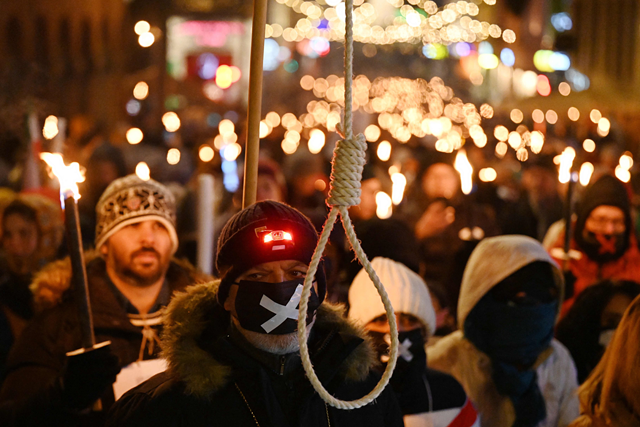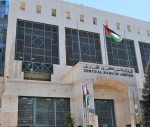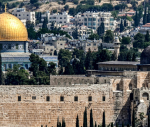You are here
Iran executes two more men in connection with protests
By AFP - Jan 07,2023 - Last updated at Jan 07,2023
PARIS — Iran on Saturday executed two men for killing a paramilitary force member during unprecedented protests sparked by the death in custody of a young woman.
The latest hangings double the number of executions to four over the nationwide protests, which escalated since mid-September into calls for an end to Iran's clerical regime.
Two men were put to death in December, sparking global outrage and new Western sanctions against Iran.
Judicial news agency Mizan Online reported "Mohammad Mahdi Karami and Seyyed Mohammad Hosseini, the main perpetrators of the crime that led to the martyrdom of Ruhollah Ajamian, were hanged this morning."
Prosecutors said the 27-year-old militiaman was stripped naked and killed by a group of mourners who had been paying tribute to a slain protester, Hadis Najafi.
The executions come in defiance of a campaign by international rights groups for the lives of the two men to be spared. Karami's father had also begged the judiciary not to kill his son.
Amnesty International had decried the "fast-tracked unfair group trial" of the two men which it said bore no "resemblance to a meaningful judicial proceeding".
Authorities have arrested thousands of people in the wave of demonstrations that began with the September death in custody of Mahsa Amini, 22.
The Iranian Kurdish woman had been arrested by morality police for allegedly breaching the regime's strict dress code for women.
Ajamian belonged to the Basij paramilitary force linked to the powerful Islamic Revolutionary Guard Corps.
He died in Karaj, west of Tehran, on November 3 after being attacked with “knives, stones, fists, kicks” and dragged along a street, a judiciary spokesman said at the time.
The court of first instance had sentenced Karami and Hosseini to death in early December, Mizan said.
On Tuesday the Supreme Court upheld the sentence.
Mahmood Amiry-Moghaddam, director of Oslo-based Iran Human Rights (IHR), said both men “were subjected to torture, sentenced after sham trials... without the minimum standards for due process.”
In a tweet, he said the latest executions “must have even stronger consequences” for Iran’s regime and specifically urged “new and stronger sanctions against individuals and entities”.
Karami’s parents had in December issued a video pleading with the judiciary to spare his life.
“I respectfully ask the judiciary, I beg you please, I ask you... to remove the death penalty from my son’s case,” said Mashallah Karami, describing his son as a former national karate team member.
Karami’s father had told Iranian media that a family lawyer had not been able to access his son’s case file.
Mohamad Aghasi, whom the family wanted to handle the case, wrote on Twitter that Karami had not been allowed to have a final meeting with his family and had foregone food and water in protest.
IHR gave Karami’s age as 22. Hossein was 39, according to another Norway-based rights group, Hengaw.
They were among 14 people courts have sentenced to death over the unrest, according to an AFP count based on official information.
Four have now been executed, two others have had their sentences confirmed by the Supreme Court, six are awaiting new trials and two others can appeal.
Dozens of other protesters face charges punishable by death, IHR said in late December.
“We are mourning as a nation,” prominent US-based dissident Masih Alinejad said in a Twitter post. “Help us save others.”
‘Political cost’
British actor of Iranian origin Nazanin Boniadi, an ambassador for Amnesty International in the United Kingdom, said on Twitter that the “political cost of Iran executions” must increase. She called for more sanctions on “regime officials complicit in rights violations”, expulsion of Iranian diplomats and asset freezes.
The latest executions were the first linked to the protests in almost a month.
Iranian officials describe the protests as “riots” and accuse hostile foreign powers and opposition groups of stoking the unrest.
On December 12 Majidreza Rahnavard, 23, was hanged publicly from a crane. He had been sentenced to death for killing two members of the security forces with a knife, and wounding four other people, Mizan reported.
Rahnavard’s execution came despite the widespread international anger sparked by the first announced execution four days earlier.
Mohsen Shekari, also 23, was put to death on charges of wounding a member of the security forces.
In late December the US Treasury Department sanctioned Prosecutor General Mohammad Jafar Montazeri, saying he was responsible for human rights abuses including torture and death-penalty trials of protesters.
The Treasury said the case of Shekari bore “little resemblance to a meaningful trial”.
On December 12 new European Union sanctions targeted Iranian officials including hardline cleric Seyed Ahmad Khatami. He was included on the list for inciting violence against protesters, including demanding the death penalty.
Related Articles
PARIS — Iran on Monday executed a second man in connection with protests that have shaken the regime for months, defying an international ou
TEHRAN — Iran’s supreme court has ordered the retrial of a Kurdish rapper who was reportedly sentenced to death over protests sparked by Mah
PARIS — Iran was slapped with new sanctions on Friday and activists called for fresh protests after the Islamic republic carried out its fir
















